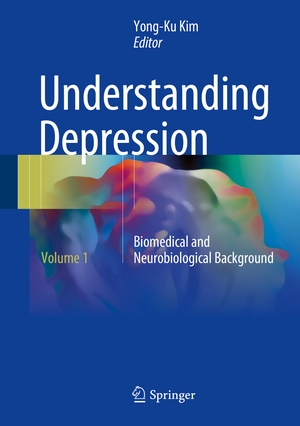Understanding Depression: Volume 1. Biomedical and Neurobiological Background
Editat de Yong-Ku Kimen Limba Engleză Hardback – 15 ian 2018
| Toate formatele și edițiile | Preț | Express |
|---|---|---|
| Paperback (2) | 1294.11 lei 3-5 săpt. | |
| Springer Nature Singapore – 15 ian 2019 | 1294.11 lei 3-5 săpt. | |
| Springer Nature Singapore – 23 dec 2018 | 1294.11 lei 3-5 săpt. | |
| Hardback (2) | 1142.75 lei 38-45 zile | |
| Springer Nature Singapore – 15 ian 2018 | 1142.75 lei 38-45 zile | |
| Springer Nature Singapore – 15 ian 2018 | 1142.75 lei 38-45 zile |
Preț: 1142.75 lei
Preț vechi: 1202.89 lei
-5% Nou
Puncte Express: 1714
Preț estimativ în valută:
218.66€ • 228.30$ • 180.97£
218.66€ • 228.30$ • 180.97£
Carte tipărită la comandă
Livrare economică 31 martie-07 aprilie
Preluare comenzi: 021 569.72.76
Specificații
ISBN-13: 9789811065798
ISBN-10: 9811065799
Pagini: 350
Ilustrații: XIII, 322 p. 16 illus., 14 illus. in color.
Dimensiuni: 178 x 254 mm
Greutate: 0.91 kg
Ediția:1st ed. 2018
Editura: Springer Nature Singapore
Colecția Springer
Locul publicării:Singapore, Singapore
ISBN-10: 9811065799
Pagini: 350
Ilustrații: XIII, 322 p. 16 illus., 14 illus. in color.
Dimensiuni: 178 x 254 mm
Greutate: 0.91 kg
Ediția:1st ed. 2018
Editura: Springer Nature Singapore
Colecția Springer
Locul publicării:Singapore, Singapore
Cuprins
1.Genetic and epigenetic aspects of depression.- 1-1.Highlights on pharmacogenetics and pharmacogenomics in depression.- 1-2.Imaging genetics studies on susceptibility genes for major depressive disorder: the present and the future.- 1-3.Gene-environmental interaction and role of epigenetic in depression.- 1-4.The role of microRNAs and long noncoding RNAs in depression: diagnosis and therapeutic implication.- 1-5.The role of early life stress in HPA axis and depression.- 2.Molecular-, cellular-level aspects of depression.- 2-1.Complex role of serotonin receptors in depression.- 2-2.Emerging role of glutamate receptors in pathophysiology of depression.- 2-3.New perspective on mTOR pathways: a new target of depression.- 2-4.Cellular aging in depression: the role of telomere-telomerase system.- 2-5.Differentiation and biological markers in subtype of depression.- 3.Neural circuit-level aspect of depression.- 3-1.Molecular, structural, and functional neuroimaging in depression.- 3-2.Resting-state activity in depression; a link to spatiotemporal psychopathology.- 3-3.Functional neuroimaging in depression: a tool to predict treatment outcome and response.- 3-4.Cortical-subcortical interactions in the pathophysiology of depression.- 3-5.Pathophysiology and treatment strategies for different types of depression.- 3-6.The effect of neurostimulation in depression.- 4.Multicellular system-level aspect of depression.- 4-1.Inflammation, depression and neurodegeneration: a possible cause of dementia in late life depression?.- 4-2.Gut-microbiota-brain axis and depression.- 4-3.The interactions of immune inflammation and oxidative and nitrosative stress with the kynurenine and melatonergic pathways in depression.- 4-4.Glia-neuron cross-talk in depression.- 4-5.Depression model in primate: relevance to novel drug discovery.- 5.Species-, individual-, gender-, culture-specific aspects of depression.- 5-1.Precision psychiatry: personalized clinical approach to depression.- 5-2.Gender differences in depression.- 5-3.An up-date on the epidemiology of major depressive disorder across cultures.
Notă biografică
Yong-Ku Kim, MD, PhD is a Professor of Psychiatry at College of Medicine, Korea University. He received a MD degree from College of Medicine, Korea University in 1987 and a PHD in psychiatry from Korea University in 1998. Dr. Kim has been affiliated with Korea University since 1998, first as an assistant professor (1998-2000), then as associated professor (2001-2005), professor (2006- present). For the past 20 years, his professional activities have extended beyond the area of pure clinical or research work. Dr. Kim has well over 200 publications in peer-reviewed international journals, including Biological Psychiatry, Molecular Psychiatry, Clinical Journal of Psychiatry, and Progress in Neuropsychopharmacology and Biological Psychiatry and 30 publications of book chapters and have made over 90 academic presentations in my area of interest. Dr. Kim is a fellow of Collogicum Internationale Neuropsychopharmacologicum, International Society for Affective Disorders, World Federation ofthe Society of biological Psychiatry. He currently sits on the editorial boards of some leading academic journals in the field of neurobiology, including Progress in Neuropsychopharmacology and Biological Psychiatry, Psychiatry Investigation, World Journal Psychiatry, Annals of Depression and Anxiety, Psychiatry Journal and so on. Dr. Kim received prestigious awards such as Astrageneca Award and Dr. Paul Janssen Schizophrenia Research Award. Dr. Kim is currently the president of Korean society of Biological Psychiatry (2016-present).
Textul de pe ultima copertă
This book, in two volumes, focuses on contemporary issues and dilemmas in relation to depression. The aim is to equip readers with an up-to-date understanding of the clinical and neurobiological underpinnings of depression and their relation to clinical manifestations and the development of more effective treatments. This first volume is devoted specifically to biomedical and neurobiological issues. Detailed information is presented on a wide range of topics, including genetics, molecular and cellular biology, and aspects at the neural circuit and multicellular system levels. Readers will gain a deeper appreciation of the factors and interactions underlying individual variation in responsiveness to stress and vulnerability to depression, as well as a clear understanding of potential treatment targets and causes of treatment resistance based on the latest research. A concluding section considers progress towards precision psychiatry and gender and cultural differences in depression. Thecompanion volume is dedicated to clinical and management issues in depression. Understanding Depression will be an excellent source of information for both researchers and practitioners in the field.
Caracteristici
Equips readers with an up-to-date understanding of the biomedical and neurobiological underpinnings of depression Elucidates the factors and interactions underlying individual variation in vulnerability to depression Identifies potential treatment targets and causes of treatment resistance
